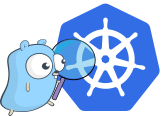kubesql
Use SQL like language to query the Kubernetes cluster manager
Install
Using go get command:
GO111MODULE=on go get -v github.com/yaacov/kubesql/cmd/kubesqlUsing Fedora Copr:
dnf copr enable yaacov/kubesql
dnf install kubesql
From source:
git clone git@github.com:yaacov/kubesql.git
cd kubesql
makeWhat does it do ?
kubesql let you select Kubernetes resources based on the value of one or more resource fields, using human readable easy to use SQL like query langauge.
Example:
# Filter replica sets with less ready-replicas then replicas"
kubesql --all-namespaces get rs where "status.readyReplicas < status.replicas"For other ways to select Kubernetes resources see #Alternatives.
Available Operators:
| Opertors | Example |
|---|---|
=, ~= |
name ~= '^test-' |
like, ilike |
phase ilike 'run%' |
!=, !~ |
namespace != 'default' |
>, <, <= and >= |
created < 2020-01-15T00:00:00Z |
is null, is not null |
spec.domain.cpu.dedicatedCpuPlacement is not null |
in |
spec.domain.resources.limits.memory in (1Gi, 2Gi) |
between |
spec.domain.resources.limits.memory between 1Gi and 2Gi |
or, and and not |
name ~= 'virt-' and namespace != 'test-wegsb' |
( ) |
phase = 'Running' and (namespace ~= 'cnv-' or namespace ~= 'virt-') |
Available Math Operators:
| Opertors | Notes |
|---|---|
+, - |
Adition and Substruction |
*, / |
Multiplation and Division |
( ) |
Aliases:
| Aliase | Resource Path | Example |
|---|---|---|
| name | metadata.name | |
| namespace | metadata.namespace | namespace ~= '^test-[a-z]+$' |
| labels | metadata.labels | |
| annotations | metadata.annotations | |
| created | creation timestamp | |
| deleted | deletion timestamp | |
| phase | status.phase | phase = 'Running' |
SI Units:
| Unit | Multiplier | Example |
|---|---|---|
| Ki | 1024 | |
| Mi | 1024^2 | spec.containers.1.resources.requests.memory = 200Mi |
| Gi | 1024^3 | |
| Ti | 1024^4 | |
| Pi | 1024^5 |
Booleans:
| Example |
|---|
status.conditions.1.status = true |
RFC3339 dates:
| Example |
|---|
status.conditions.1.lastTransitionTime > 2020-02-20T11:12:38Z |
Output formats:
| --output flag | Print format |
|---|---|
| table | Table |
| name | Names onlly |
| yaml | YAML |
| json | JSON |
Arrays and lists:
kubesql support resource paths that include lists by using the list index as a field key.
# Get the memory request for the first container.
kubesql --all-namespaces get pods where "spec.containers.1.resources.requests.memory = 200Mi"Identifier escaping
If identifier include characters that need escaping ( e.g. "-" or ":") it is posible
to escape the identifier name by wrapping it with [...] , `...` or "..."
Examples
All namespaces
# Get pods that hase name containing "ovs"
kubesql --all-namespaces get pods where "name ~= 'ovs'"
AMESPACE NAME PHASE hostIP CREATION_TIME(RFC3339)
openshift-cnv ovs-cni-amd64-5vgcg Running 192.168.126.58 2020-02-10T23:26:31+02:00
openshift-cnv ovs-cni-amd64-8ts4w Running 192.168.126.12 2020-02-10T22:01:59+02:00
openshift-cnv ovs-cni-amd64-d6vdb Running 192.168.126.53 2020-02-10T23:13:45+02:00
...Using Regexp
# Get all pods from current namespace scope, that has a name starting with "virt-" and
# IP that ends with ".84"
kubesql get pods where "name ~= '^virt-' and status.podIP ~= '[.]84$'"
AMESPACE NAME PHASE hostIP CREATION_TIME(RFC3339)
default virt-launcher-test-bdw2p-lcrwx Running 192.168.126.56 2020-02-12T14:14:01+02:00
...SI Units
# Get all persistant volume clames that are less then 20Gi, and output as json.
kubesql -o json get pvc where "spec.resources.requests.storage < 20Gi"
...
{
"storage": "10Gi"
}
...Comparing fields
# Get replicas sets with 3 replicas but less ready relicas
kubesql --all-namespaces get rs where "spec.replicas = 3 and status.readyReplicas < spec.replicas"
...Print help
kubesql --help
...
Config File
Users can add aliases and edit the fields displayed in table view using json config files, see the example config file.
Query language
kubesql uses Tree Search Language (TSL). TSL is a wonderful human readable filtering language.
https://github.com/yaacov/tree-search-language
Alternatives
jq
jq is a lightweight and flexible command-line JSON processor. It is posible to
pipe the kubectl command output into the jq command to create complicted searches.
https://stedolan.github.io/jq/manual/#select(boolean_expression)
kubectl --field-selector
Field selectors let you select Kubernetes resources based on the value of one or more resource fields. Here are some examples of field selector queries.
https://kubernetes.io/docs/concepts/overview/working-with-objects/field-selectors/

